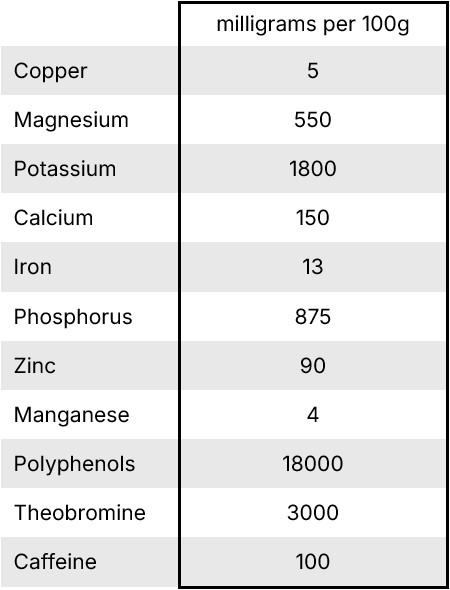Science & Health
Cocoa is recognised universally as a highly nutritious natural food. However most of us are likely consuming cocoa in the form of chocolate, and therefore it's important to be aware of the nutritional impact of what you're putting into your mouth, good and bad.
Is chocolate good or bad for you?
Not all chocolate is bad. Not all chocolate is good. As a natural food, cocoa itself is highly nutritious, but when it's combined with other ingredients like sugar in chocolate, it's nutritional impact is diminished and is negated altogether in some forms of chocolate. Chocolate confectionery is rarely good for you. Any chocolate with a sugar content higher than around 30% is unlikely to offer much positive health benefit, and the more sugar it has, the worse it is for you. Compound chocolate is similarly not generally healthy. The healthiest chocolate is dark couverture chocolate with at least 70% cocoa solids. All research done on health benefits of chocolate have been with 70% cocoa-content dark chocolate. As with anything, moderation is always advisable. Eating any food in excess can lead to an imbalance or deficit of essential nutrients.
Read more about the various types and formats of chocolate
Cocoa is high in antioxidants
Cocoa is naturally loaded with polyphenols and procyanidins both of which have beneficial effects on the body's cardiovascular system by lowering blood pressure, anti-inflammatory properties, reducing platelet aggregation, increasing the HDL/LDL ratio and reducing LDL oxidation.
Studies have shown that as soon as 30 minutes after eating one 40 gram serving of dark chocolate, blood levels of the two main antioxidants in chocolate, epicatechin and catechin, are heightened. They peak two hours after consumption and are cleared from the body after about six hours. Antioxidants work by protecting your cells from damaging molecules called free radicals which oxidise and degrade your body, skin and organs. Free radicals are unstable oxygen molecules that can trigger changes in the structure of normally healthy cells. This damage is believed to be an underlying cause of many chronic diseases. Antioxidants neutralise free radicals and slow oxidisation.
Polyphenols are a large class of molecules found in fruits and vegetables like oranges, soybeans and berries. Dark chocolate and cocoa are particularly high in a sub-class of those compounds called flavanols, which are also found in red grapes and tea.
The reason dark chocolate and cocoa powder rank so high is that the antioxidants are very concentrated. Around 12-16% of the weight of dry raw cocoa beans consists of polyphenols alone.
Cocoa is naturally rich in minerals
The table below shows the amount of minerals and other compounds that are found in cocoa powder on average. These amounts may vary depending on a number of factors including fermentation, soil quality, ripeness when cocoa pods are picked, cocoa processing methods and food preparation processes.

Cocoa naturally contains high levels of magnesium, potassium, manganese, copper, phosphorus and calcium which are all important for good health.
One average dark chocolate bar (70% cocoa content) provides nearly 12 percent of your daily requirement for magnesium, which may be important for people at risk of several chronic illnesses such as type 2 diabetes, hypertension, cardiovascular disease and restless leg syndrome.


